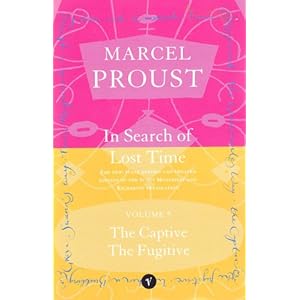--The blurb--
"In the two novels – The Captive and The Fugitive – contained in this volume, Proust’s narrator is living in his mother’s apartment in Paris with his lover, Albertine. However, this is far from an idyllic state of affairs. His obsessive love for her means that their relationship is shadowed by jealousy and headed for tragedy."
--The review--
These two parts of the In Search Of Lost Time series are where confusion can arise as to whether the series is a six-part one or a seven-part one. Originally written as two separate novels, The Captive and The Fugitive are now so commonly packaged together that the series is more often regarded as a six-part affair than the seven-part opus intended by the author. Nevertheless, editors are not being silly to put these two parts together in one volume: the result is probably the clearest narrative arc that I have seen so far across all other volumes of Proust's epic.
This is not to say that the flaws present in other volumes cannot be seen here. Unsurprisingly, the two parts are still pervaded by overrated social gossip (about which the reader does not care, since those characters being gossipped about have not been developed nearly fully enough to make us care) and Proust's circular and obsessive version of love. It is the superficial whisperings that weaken the end of The Fugitive in particular, and Proust's jealous and jaded feelings towards Albertine that bring us down again in between moments where it does seem, briefly, as if he really does love her in a form that most people would recognise.
But we must remember, too, that ultimately there are as many kinds of love as there are hearts - unrequited love and love that is suffused with paranoia may not be the same as reciprocal love, but they are types of love nonetheless. Lust, then, perhaps inevitably, features strongly again in these two volumes, as various revelations are finally released into the open to spice up proceedings. It is perhaps this feeling of "He/She did what with who?!" that makes these two volumes more readable and exciting - and that because they concern characters that we already know well.
Equally, Proust keeps the reader on their toes - having made us feel at the end of Sodom and Gomorrah that we knew what would happen next (namely, a car crash of a marriage with Albertine), he then turns around and proves us all wrong in shocking literary style that would prove to be classic (the demise of a key character is replicated in such classics as Gone With The Wind, if you would like a clue). Occasionally he also continues to provide lightning bolts of lucidity that are ultimately what the reader continues to read for, in search of something universal with which we can all identify: "one remembers an atmosphere because girls were smiling in it," the narrator says, recalling a party. He also makes curious, thought-provoking statements, such as the notion that "memory has no power of invenion", which backs up his idea that "it is powerless to desire anything else, let alone anything better, than what it has already possessed", but fails, in my mind, to recognise the idea that memory is indeed so capable of invention that it can twist and contort to an alarming degree what has actually happened to us. He harks back to more ancient ideas in his notion that when we recover from grief, it is not really us that is 'the recovered one' but rather another 'self' waiting for us in reserve for when such traumatic things happen to us, to 'fill in' for our original self.
Such fullness combined with such scandal is probably what spurs the reader on to the final volume, in conjunction with the sudden extra narrative momentum that appears in The Captive and The Fugitive. I shall be equally interested to see the filmic version of these two volumes in order to reinforce my own personal Proustian journey in search of lost time.
Other works by Marcel Proust
Swann's Way (volume 1)
Within a Budding Grove (volume 2)
The Guermantes Way (volume 3)
Sodom and Gomorrah (volume 4)
Time Regained (volume 6/7)






No comments:
Post a Comment